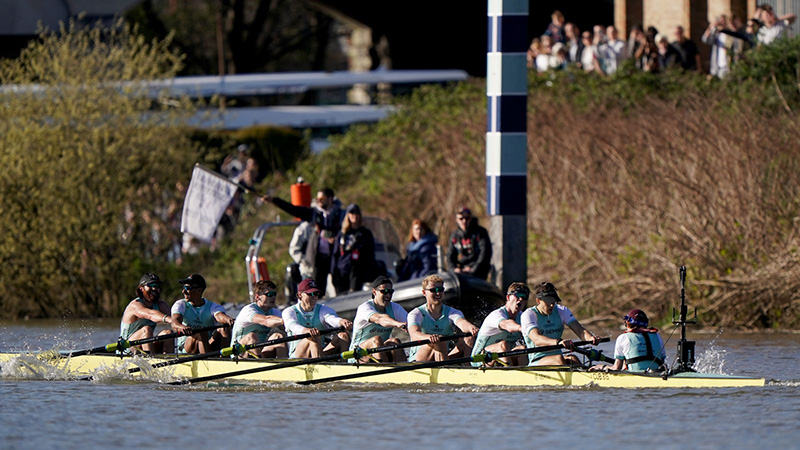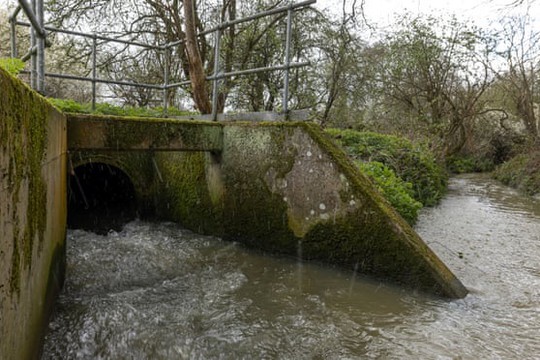Photo: The Guardian
Water companies in England have faced a barrage of criticism as data revealed raw sewage was discharged for more than 3.6m hours into rivers and seas last year in a 105% increase on the previous 12 months, writes ‘The Guardian’.
The scale of the discharges of untreated waste made 2023 the worst year for storm water pollution. Early data seen by the Guardian put the scale of discharges at more than 4m hours, but officials said the figures were an early estimate.
The Liberal Democrat leader, Ed Davey, said the scandal of raw sewage pouring into waterways should be declared a national environmental emergency.
The data on discharges from storm overflows reveals the duration and the number of discharges from individual overflows across the network in England. The 3.6m-plus hours of raw sewage and rainwater discharged over the year includes huge spikes in some outflows. Forty per cent of South West Water outflows discharged raw sewage more than 40 times, while nearly a third of United Utilities outflows and 23% owned by Yorkshire Water discharged 60 times or more.
Thames Water was responsible for the biggest increase in the number of discharges, with its overflows dumping on 16,990 occasions, a 112% increase on 2022.
Also top of the list for sewage spills was the River Calder near Huddersfield, the Aire near Bradford and the lower section of the Tyne around Newcastle and Sunderland, the Guardian’s analysis of Environment Agency data found.
Davey said the scandal had to be treated as an environmental national emergency. He said: “Only by treating the sewage scandal with the urgency it demands can we save our rivers and beaches for future generations to enjoy. Rishi Sunak and the Conservative party have failed to listen and as a result sewage spills are increasing, our precious countryside is being destroyed and swimmers are falling sick.”

Thirty-five years ago, investors flocked to buy into the water industry, an essential public utility and a monopoly, in a sell-off by Margaret Thatcher (photo) which was deeply unpopular with the public, but saw shareholders gain 40%, on average, on the first day of trading.
Despite the £56bn paid out in dividends to shareholders in the sector since privatisation, today investors in the biggest beast, Thames Water, appear to be running for the hills, notes ‘The Guardian’.
The water industry has become a bad bet. Billions are required to fix pipes and treatment plants which have been left to rot for years, to invest in building resilience to the climate crisis, and to meet a tougher environmental regime – one arguably forced upon the regulator, Ofwat, by public outrage over sewage discharges.
Combine that with higher interest rates on the £18bn debt held by Thames and its parent company, more than half of which is index-linked, and the attractions of what was once considered a cash cow fade dramatically.
The investors, which include the Canadian public pension fund Omers (Ontario Municipal Employees Retirement System), the UK’s University Superannuation Scheme, Abu Dhabi’s sovereign wealth fund and the Beijing-controlled China Investment Corporation, pulled the plug on a commitment to provide £500m of equity last week – part of a total of £3.25bn in extra cash the company is seeking – saying Ofwat’s intransigence made Thames “uninvestible”.
Their decision came a day after water companies came under fire for record raw sewage discharges into rivers and seas, which reached 3.6m hours in 2023.
The Liberal Democrats’ treasury spokesperson, Sarah Olney, believes the travails of Thames Water and its parent company have now exceeded the threshold for taking it into special administration.
“Thames Water is a broken firm,” says Olney. “It is teetering on the brink of collapse and it is clear that things cannot go on as they are. Drastic action is needed to keep the taps running for millions of customers.
“The board should hang their heads in shame. No longer should this firm be allowed to mistreat customers and destroy our environment with their filthy sewage.”

A rower on the Oxford team which lost the Boat Race (photo) has complained about "poo in the water" and claimed that sickness caused by an outbreak of E. coli played a part in their defeat.
There were warnings this week before the Boat Race about pollution levels in the River Thames and the possible risk to competitors.
But the historic race went ahead, and both the men's and women's races were won by the University of Cambridge on Saturday afternoon.
Afterwards, the University of Oxford's Leonard Jenkins told the BBC his team “had a few guys go down pretty badly with E. coli, this morning, I was throwing up, I was not sure there would be a chance for me to be in the boat… It would be a lot nicer if there wasn't as much poo in the water.”
Earlier this week, it was revealed that high levels of E. coli, which can cause a range of serious infections and other side-effects, had been found along the Boat Race course.
Oxford's coach Sean Bowden called it a “national disgrace”.
Campaigning group River Action said its testing suggested the source of pollution is from Thames Water discharging sewage directly into the river and its tributaries.
read more in our Telegram-channel https://t.me/The_International_Affairs

 10:41 06.04.2024 •
10:41 06.04.2024 •























